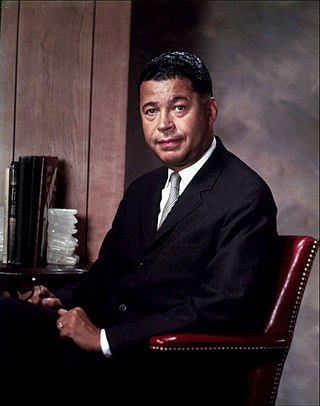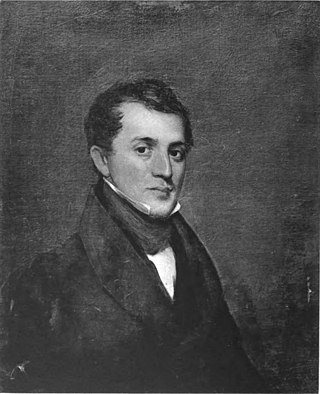
Edward William Brooke III was an American lawyer and Republican Party politician who represented Massachusetts in the United States Senate from 1967 to 1979. He was the first African American elected to the United States Senate by popular vote. Prior to serving in the Senate, he served as the Attorney General of the Commonwealth of Massachusetts from 1963 until 1967. Edward Brooke was the first African-American since Reconstruction in 1874 to have been elected to the United States Senate and he was the first African-American since 1881 to have held a United States Senate seat. Brooke was also the first African-American U.S. senator to ever be re-elected.

Endicott Howard Peabody was an American politician from Massachusetts. A Democrat, he served a single two-year term as the 62nd Governor of Massachusetts, from 1963 to 1965. His tenure is probably best known for his categorical opposition to the death penalty and for signing into law the bill establishing the University of Massachusetts Boston. After losing the 1964 Democratic gubernatorial primary, Peabody made several more failed bids for office in Massachusetts and New Hampshire, including failed campaigns for the U.S. Senate in 1966 and 1986.

Leverett Atholville Saltonstall was an American lawyer and politician from Massachusetts. He served three two-year terms as the 55th Governor of Massachusetts, and for more than twenty years as a United States senator (1945–1967). Saltonstall was internationalist in foreign policy and moderate on domestic policy, serving as a well-liked mediating force in the Republican Party. He was the only member of the Republican Senate leadership to vote for the censure of Joseph McCarthy.

The 1966 United States Senate elections were elections on November 8, 1966, for the United States Senate which occurred midway through the second term of President Lyndon B. Johnson. The 33 seats of Class 2 were contested in regular elections. Special elections were also held to fill vacancies. With divisions in the Democratic base over the Vietnam War, and with the traditional mid-term advantage of the party not holding the presidency, the Republicans took three Democratic seats, thereby breaking Democrats' 2/3rds supermajority. Despite Republican gains, the balance remained overwhelmingly in favor of the Democrats, who retained a 64–36 majority. Democrats were further reduced to 63–37, following the death of Robert F. Kennedy in June 1968.

The 1964 United States Senate elections were held on November 3. The 33 seats of Class 1 were contested in regular elections. Special elections were also held to fill vacancies. They coincided with the election of President Lyndon B. Johnson by an overwhelming majority, to a full term. His Democratic Party picked up a net two seats from the Republicans. As of 2023, this was the last time either party has had a two-thirds majority in the Senate, which allowed the Senate Democrats to override a veto, propose constitutional amendments, or convict and expel certain officials without any votes from Senate Republicans. However, internal divisions would have prevented the Democrats from having done so. The Senate election cycle coincided with Democratic gains in the House in the same year.

The 1954 United States Senate elections was a midterm election in the first term of Dwight D. Eisenhower's presidency. The 32 Senate seats of Class 2 were contested in regular elections, and six special elections were held to fill vacancies. Eisenhower's Republican party lost a net of two seats to the Democratic opposition. This small change was just enough to give Democrats control of the chamber with the help of the Independent who at the start of this Congress in January 1955 agreed to caucus with them; he later officially joined the party in April 1955.
The Massachusetts Republican Party (MassGOP) is the Massachusetts branch of the U.S. Republican Party.

The United States Senate election of 1972 in Massachusetts was held on November 7, 1972. Incumbent Republican Senator Edward Brooke defeated Democratic nominee John Droney in a landslide. As of 2024, this remains the last time that a Republican has been elected to Massachusetts’s Class 2 Senate seat and the last time a Republican has been elected to either Senate seat for a full term. This was also the last time until 2010 that a Republican would win any U.S. Senate election in the state. This election was the first time ever that an African-American United States senator was re-elected to the United States Senate.

The 1964 Massachusetts gubernatorial election was held on November 3, 1964. Incumbent Governor Endicott Peabody ran for re-election, but was defeated by then-Lieutenant Governor Francis X. Bellotti in the Democratic Party primary. Bellotti went on to lose the general election to former Governor John Volpe.

The United States Senate election of 1948 in Massachusetts was held on November 2, 1948, with Republican incumbent Leverett Saltonstall defeating his challengers.

The 1944 United States Senate special election in Massachusetts was held on November 7, 1944. Republican Governor Leverett Saltonstall was elected to finish the term of Henry Cabot Lodge Jr., who had resigned from the Senate to serve in World War II.

The 1952 Massachusetts gubernatorial election was held on November 4, 1952. Republican Christian Herter defeated Democratic incumbent Paul A. Dever, Socialist Labor candidate Lawrence Gilfedder, Peace Progressive candidate Florence H. Luscomb, and Prohibition candidate Guy S. Williams.
Gordon M. Nelson was an American political activist who served as chairman of the Massachusetts Republican State Committee from 1976 to 1980.
The 1966 Massachusetts general election was held on November 8, 1966, throughout Massachusetts. Primary elections took place on September 13.
A Massachusetts general election was held on November 3, 1964, in the Commonwealth of Massachusetts.
A Massachusetts general election was held on November 6, 1962, in the Commonwealth of Massachusetts.
A Massachusetts general election was held on November 8, 1960, in the Commonwealth of Massachusetts.
A Massachusetts general election was held on November 4, 1958, in the Commonwealth of Massachusetts.
A Massachusetts general election was held on November 2, 1954 in the Commonwealth of Massachusetts.

John Clarke Lee was an American lawyer, merchant, banker and politician who co-founded the prominent stock brokerage firm of Lee, Higginson & Co.

















